Dashnor Kaloçi
The third part
Memorie.al publishes the unknown story of the assassination attempt on King Zog on February 20, 1931 while he was in Vienna for treatment, by a group of Albanian political emigrants living in the Austrian capital, led by Ndok Gjeloshi, Aziz Çami, two former officers of the Albanian Army who had taken part in the June 1924 Uprising, as well as Qazim Mulleti and Angjelin Suma, who after ambushing at the main gate of the Vienna Opera House, shot several times with their revolvers against Zog and his adjutants, while he was getting into his vehicle that was waiting for him nearby, leaving Major Llesh Topallaj killed on the spot and injuring the Minister of Foreign Affairs of Albania, Ekrem bej Libohova . How was that news conveyed and the whole story of the assassination of King Zog who miraculously escaped unaffected by the assassins’ bullets, in the biggest newspapers of Europe and the USA, such as: “The New York Merald”, ” Daily Telegraph, Daily Express, Chicago Tribune, Moring Post, Universal, Daily Herald, The Christian Science Monitor, etc., which found the opportunity and published for several months on the pages of with dozens of articles, where in addition to the event in question, devoted many articles to King Zog’s friendship with the Austrian Baroness Maria de Janko and her sister, Franciska de Janko, who had been for some time in Tirana and with Zog’s visit to Vienna, they too had gone there to be accommodated in the Hotel “Regina”, where the King of Albanians during all those days, often frequented them and went out with them for walks in the most beautiful parks of Vienna.
“A savage attack on the King of Albania Zog, took place late tonight in Vienna where the King had come to recover from Nevrostenia and nicotine poison. King Zog with his suite and some Austrian officials had just left the Opera House where he was playing “The Legend of Joze”, contacted by Richard Strau, and as he was taking his place in the car waiting for him outside the opera, revolver blasts were heard. on both sides of the car. The assailants, two people dressed well in their clothes at night, fired rifles at the windows of the car from a close distance. Zog’s men surrounded the car and pulled the revolvers out of their belts and fired at the catapults with a coolness, presumably at the top of the mountains in the heart of Albania and not near the great Vienna Opera. Major Topollaj, one of the King’s suites, together with a braver minister, sacrificed their lives to bravely face the rain of bullets in order to save their King. Topallaj fired four times with a revolver before falling to the ground before a bullet hit him. The Major, his minister, Marshall Libohova, who has a large body, fell to the ground before the King and continued to lie on the benches, which were repulsed until he received a bullet in the dagger. Twelve more were made upon the King, and his salvation seemed a marvelous thing. The Katilas, unable to achieve their goal, were able to retaliate, but the people of Vienna, angered by the use of the generosity of their city, seized the Katilas and beat them badly, until the police arrived. Both cats were sent to a prison and are now being questioned. “King Zog, who kept his composure during this event, took a car and went to the Imperial Hotel on the Ringstrasse where he has lived since he came to Vienna.”
This is what is written, among other things, in the British newspaper “Daily Expres” dated February 21, 1931, which in its main pages gave the news of the assassination of King Zog by a group of Albanian political emigrants led by : Ndok Gjeloshi, Aziz Çami, Qazim Mulleti and Angjelin Suma, who lived as asylum seekers in the Austrian capital, who after making the plan to kill Zog, that day had ambushed in front of the main entrance of the Vienna Opera House, where the King of Albanians accompanied by his adjutant, Major Llesh Topollaj and the Minister of Foreign Affairs, Ekrem bej Libohova, were watching the performance of the opera “Legend of Joze”, and the moment they got out and got into the vehicle waiting for them near the gate of the Opera House, they fired several bullets from their revolvers, leaving the King’s adjutant, Major Llesh Topollaj dead, and wounding the Minister of Foreign Affairs, Ekrem bej Libohova, who with his body j defended Zog, who with his revolver, fired several times at the assassins.
Regarding this event which became public only after the ’90s, Memorie.al has provided a voluminous file from the Archive of the Ministry of Foreign Affairs in Tirana, (which is published for the first time), where there is a correspondence of the Ministry of Foreign Affairs of the Zog Monarchy with the Albanian Consulate in Vienna, which, among other things, sent to Tirana all the photocopies of the most famous newspapers of Europe and the USA, which for several months, devoted much writing to the event in question. All these articles translated at the Ministry of Foreign Affairs in Tirana as well as various archival documents about the event of the assassination of King Zog, Memorie.al is publishing them in several issues in a row, starting from today’s article and giving them with the written language of that time, without any changes as occurring in the relevant file.
Continued from the previous issue
The world press on the event of the assassination of King Zog in Vienna
News according to Vienna notebooks
According to the details given by the Vienna notebooks, it is understood that the assassination attempt against the King of the Albanians took place in the middle of a real war of revolvers. head, the wounds of the Minister of the Court, Mr. Eqerem Libohova, as previously announced are minor. The king, who remained unharmed by the assassination, accompanied by the general and the pretender, went to the hotel (“Imperjal”), the theater audience that got angry in an extraordinary way and had to judge the assassins.
Vienna, on the 21st of 2, 6 p.m.
In the course of the assassination attempt against the life of the King of the Albanians, the driver of His Majesty, make the following statements:
The adjutant, Major Llesh Topallaj, had just stepped on the step of the car and wanted to go inside, when he noticed a man in a black coat and hat of the same color approaching the car, he pulled the revolver out of his pocket. and address it to the King. At that moment, two more shots were felt and Major Topallaj fell and drowned in blood on the scale of the car, which happened later and developed less than against the rifles, one after the other. I pulled out my revolver and the assassin brought the rifle from me, I opened the car door which slammed into the assassin’s face, with that moment a bullet passed over my head. Major Topallaj’s body served as a protector for His Majesty the King.
On the lifestyle of the assassins, the notebook provides the following news:
Ndok Gjeloshi has not seen any work since the fall, his wife who was receiving money from his house, seems to be keeping it. Albanian press spokesman Lea, near undlihc, announces the notebook above mentioned that the two assassins were notified long ago by the consulate. These people have never had a certain political program and they were angry because they did not have their ranks in Albania again and could not do with the previous power.
Legation Advisor, Mr. Çatin Saraçi, happened to be on the side at the time of the assassination and had fired rifles against the assassins, he was mistakenly remembered as an assassin and with great difficulty he was able to escape from the people’s own judgment on the assassination of the King of the Albanians.
Vienna notebooks in the closing edition also provide the following information:
Nok Gjeloshi’s wife was questioned by the police and stated that she had no knowledge of her husband’s plans, that yesterday he had been with a friend of his in a religious prison. Albanian emigrants used to gather in “Ringrastratse-kafe”, but recently they gathered in a cafe in “Tetin Bezirsk”, where some of them were last night.
Ndok Gjeloshi stated in his questions, that he was sorry that he could not carry out the purpose of killing the King. In the persecution of the twelve Albanian emigrants who were arrested, they found various weapons and ammunition which were seized.
And the King’s car suffered heavy blows from bullets fired by assassins. According to the stories of Nok Gjeloshi’s wife and the words of the lady of his house, these expected few home visits and that Gjeloshi never increased correspondence or money.
On the second assassin, Aziz Çami, the residents of the house where he was staying stated that Aziz did not even bake with anyone and lived in very bad conditions.
Vienna, 21, hours 18 and 55.
Countless telegrams were received today from King Zog from Austria and Albania and from other countries congratulating him on his rescue from danger, on the part of the diplomatic corps and important people of the Viennese social circles.
Signatures were placed in the special register of visits to the hotel of the delegation of the Austro-Albanian society, which presented congratulations to the King, he replied that he was happy that in this event no Austrian was harmed and the King, after the time of vacation and departure from Vienna, has to remember the capital of Austria with sympathy and gratitude.
The king expressed full confidence that the activity of the society would bring very valuable fruits to both countries. The king is deeply saddened by the death of Major Llesh Topallaj, I order the transport of his body to Albania.
Radio broadcast of the Minister Mr. Eqerem Libohova, shows that her leg bone has been injured and recovery is expected in a short time.
Vienna, 21, 20 and 40 o’clock.
Deputy Chancellor and Minister of Foreign Affairs. Z. Dr. Shober addressed the Albanian Minister of Foreign Affairs in Tirana, a telegram through which he expressed the anger of King Zog’s government, and expressed his true satisfaction for witnessing the assassination.
At once Mr. Dr. Shoberi assures the Minister of Foreign Affairs that he participates deeply in the grief of the death of Major Topollaj, and expresses the hope for a speedy recovery of the Minister of the Court, Mr. Libohova.
Vienna, 21, 20 and 35 o’clock.
In the morning, King Zog sod visited the Minister of the Court, Libohova, whose health condition is good and without fever.
Comes, 21, 23 and 15 o’clock.
The accusations leveled at the leaders of the Albanian emigrants in Vienna, give us reasons to doubt the complicity of the Albanian merchant Qazim Mulleti, born in Tirana in 1896, resident in the street “Floriangasese” no. 19.
Excerpted from The Ciristian Scienice Monitor
Boston. 27 Fruer, 1931 THE BIRD KING LEADS ALBANIA ON THE WAY OF A NATION
“Go slow”, ruler of the small Kingdom, but has reached the peak of the implementation of calm
Special news for “Christian Scie ce Monitor”
Tirana, Albania.
Although the past and the future are difficult, Albania under the rule of King Zog, young and brave, has been able to face the event with confidence.
The National Bank has been under Italian control for five years now, and the financial affair has been gradually regulated: new roads are being repaired, thus opening up Albania both economically and in terms of organizing itself as a national entity, under the leadership of Italian officers. and civilian experts.
The history of Albania as a new nation, after the chaos of the great war, is the whole history of King Zog himself, who with his return in 1924, in his own district of Mat, has always been in the forefront of events state. He taught at the Turkish school, and later at the officers’ school in Bitola.
King Zog’s first action was to break an uprising against Prince Wied, vue in front of Albania by the great powers after the Balkan war of 1912-1913, when the Turks lost the war.
Wied’s rule was brief due to the great war, during which Albania was occupied by Greeks, Italians, Austrians, Serbs, Montenegrins and the French army. And when peace was made, Ahmed Zagolli, as he was called then, took over the presidency to form the national government, being himself Minister of Internal Affairs, and thus was charged with the burden of forming a permanent government, which is still there. holds even today.
They have never had a nation
Ten years is a short period in the history of a nation, especially for a qi nation, so that when Ahmeti came to power, they would never have a state.
Until then, the regions of central Albania were ruled by beys, who had received bad fortunes as a reward for their services to Turkey. Their lands were worked by the poor peasants who were forced to give half of their produce to the beys, and these peasants lived in old houses made of adobe boards.
In the north the highlanders were divided into tribes, who remained isolated from the rugged mountains, the vast forests from the lack of communication, and the quarrels between them. These were ruled by the Bajraktars and by a council of elders who administered the land according to the canon of Lek Dukagjini, which began in the fourteenth century.
The year 1931 opened with the task of curtailing the power of the beys and fulfilling the political union of the tribes — so far not complete, but quite advanced. The road would hit them, a national army would form them, and a stronger national feeling would be created. And before these obligations could begin, I had to stop the outside attack once.
In 1920 there was an Italian force in Albania in order to annex Vlora, the Albanians with Ahmeti played a big unofficial role, they took up arms and the Italians were forced to leave. The following year, the Yugoslavs occupied northern Albania, and this time Ahmeti was the commander of the forces fighting them. Eventually, the Yugoslavs left with the intervention of the League of Nations.
THE TIMES March 2, 1931
PLOT AGAINST KING BIRD
ACTIVITY OF ALBANIAN REFUGEES
From our correspondent
Statements are now circulating in Tirana in the official circles here that say that the assassination attempt against King Zog was part of a conspiracy organized by the Albanian refugees in Yugoslavia to take advantage of some dissatisfaction that exists and the confusion that would have come after the assassination of The King.
Between 30 January and 2 Fryer, Minister of Yugoslavia. Mr. Nastassiyevition informed the Albanian Government that a plot to assassinate King Zog had been prepared in Vienna. Such a statement was made to the Austrian Government by the Minister of Yugoslavia in Vienna, before the assassination of Archduke Franz-Ferdinand in 1914.
It is said here that with 3 Fruer, a member of the Bushati family left his home in Sarajevo and two days later he was baking, especially with all the leaders of the Albanian National Revolutionary Union in Vienna. A meeting of the Union was held on 7 February to elect me as the new chairman, Mr. Angjelin Suma. It is said that the other chiefs are roasting in Athens and that they have sought to gather recruits in Epirus.
The word started circulating on both sides of the Yugoslav-Albanian border with 11 Fruer that he would make an assassination attempt against the life of King Zog on the second day of Eid, that is, with 20 Fruer and that a refugee informs them well, was tue çue word almost 1000 of his people among the villagers, shops and others living near the border, prepared me for action. It is said that about 200 armed men gather near Gjakova./Memorie.al
Continues in the next issue




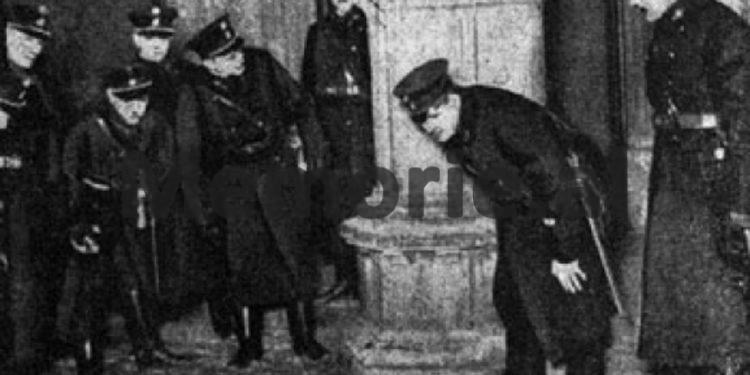
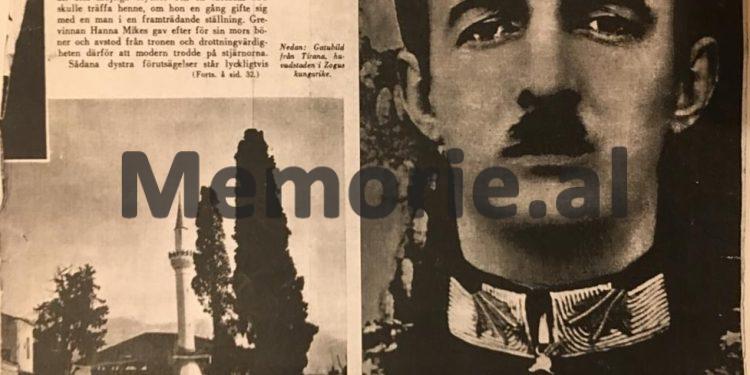
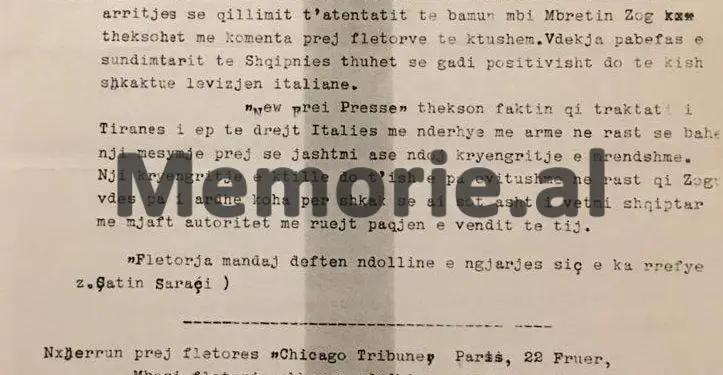
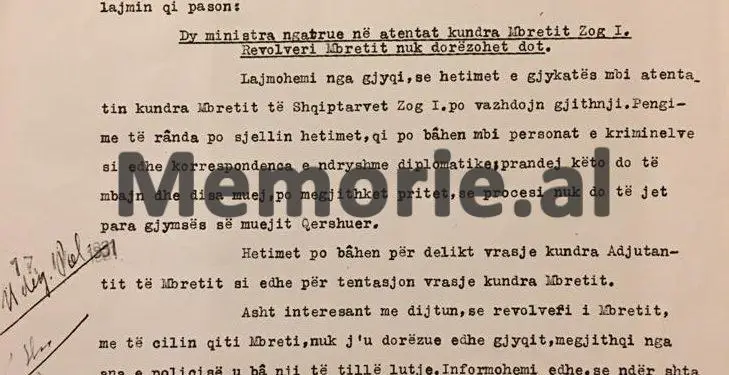
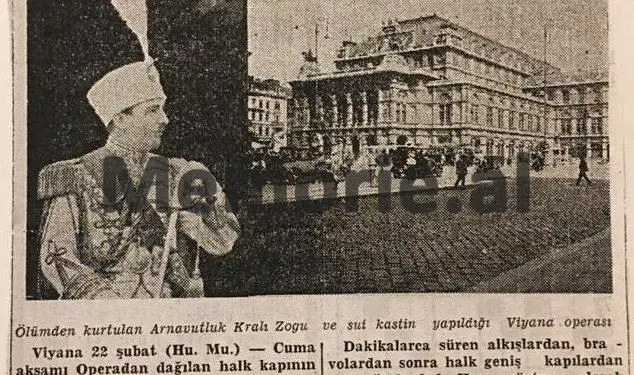
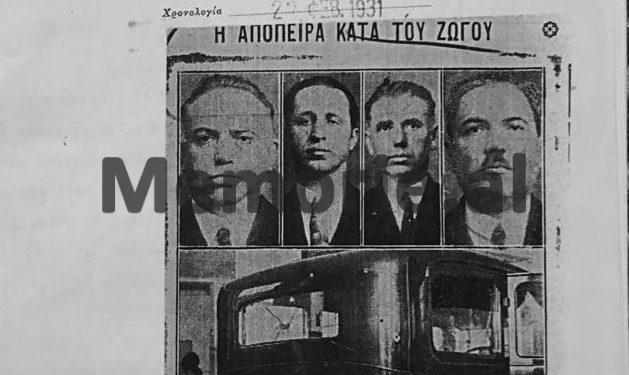
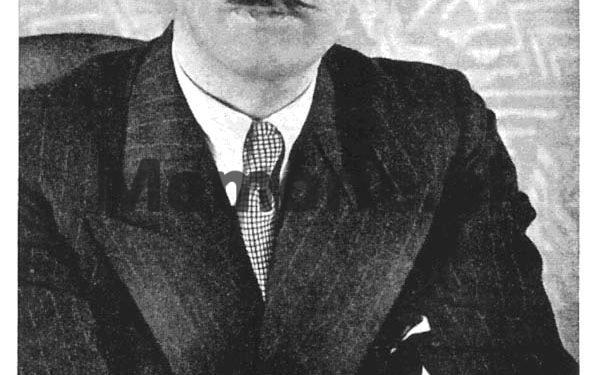
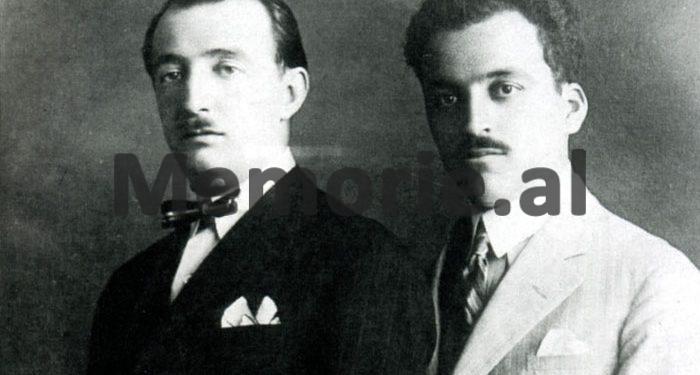
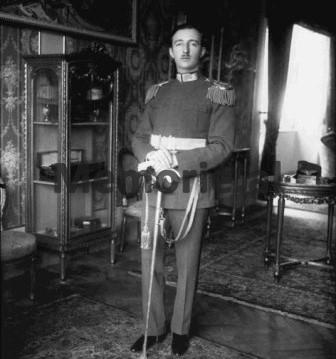
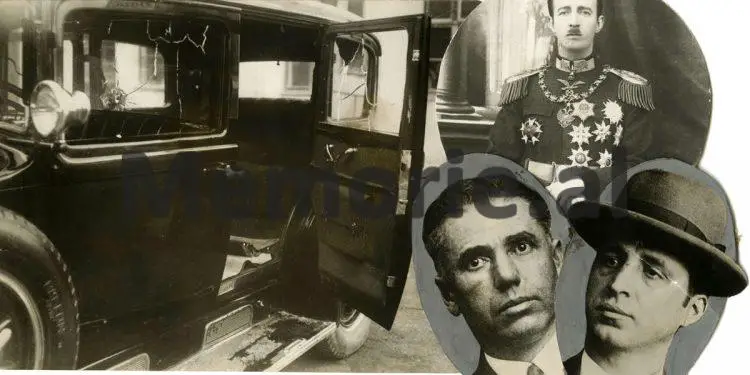
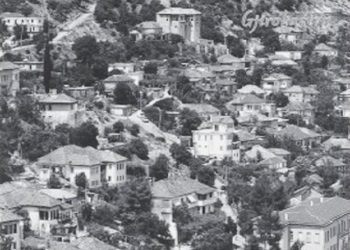
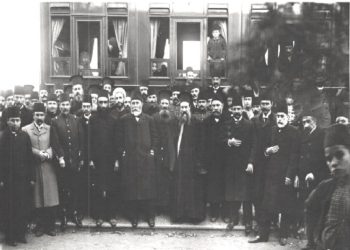
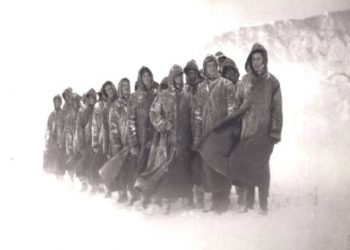

![“When the party secretary told me: ‘Why are you going to the city? Your comrades are harvesting wheat in the [voluntary] action, where the Party and Comrade Enver call them, while you wander about; they are fighting in Vietnam,’ I…”/ Reflections of the writer from Vlora.](https://memorie.al/wp-content/uploads/2025/06/admin-ajax-4-350x250.jpg)

